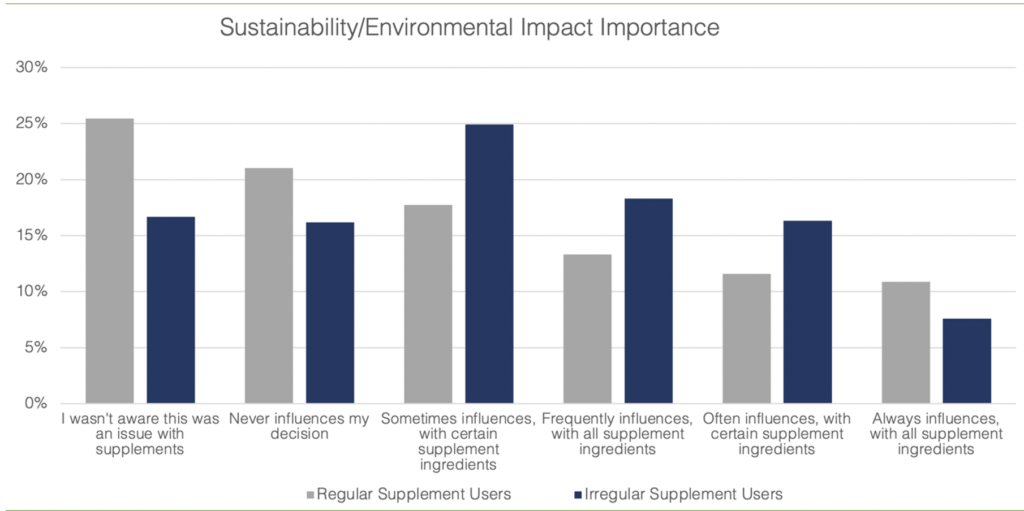ITC Insights
For the last few years I’ve been a major proponent of the idea that consumers are becoming more demanding about the ethical and ecologically ‘better’ supplements. And that those brands fulfilling this niche will be in prime position when the demand fully shifts.
The results of the latest ITC Insights survey have me questioning myself …
My thinking goes (or went) like this:
There is clearly a type of consumer who values sustainable and ethical products These shoppers buy specific products in retail. They follow specific brands that are good for the planet.
Until recently, these brands focused solely on being environmentally good. Perhaps they were also inherently healthy, but they did not make a song & dance about it. The messaging was always about the planet, about Fairtrade, about organic, or maybe another eco label.
Then things changed. Food brands that traditionally played on messaging around sustainability and being good for the planet suddenly started creating messaging around the fact they were also good for you—they were simple whole foods, that they were healthy.
It seems (or seemed) obvious to me that as FMCG brands that traditionally focused their consumer offerings on being sustainable and ethical moved to extol their healthy benefits too, then the mirror image should be seen in in the healthy and functional space … with functional foods and supplement brands that traditionally played solely on health messaging beginning to focus more messaging on ethical and environmental benefits of their products and processes.
To some degree, this has happened, though certainly there are not enough brands taking this seriously.
Don’t just take my word for it
Every year Industry Transparency Center and its Ingredients Transparency Center runs a consumer insights survey. This year, our expanded remit asked more than 2000 shoppers in the USA, UK and Germany for insights on multiple topics and categories.
We’ll be sharing much more data on the wider findings from our ITC Insights Consumer Survey in the coming months, but ahead of our NaturallyInformed event focusing on driving sustainability in the supply chain later this week – you should absolutely register if you have not already – I want to dig into what this consumer data tells us (or specifically me) about my long-standing theory.
It’s not pretty reading for me… more than a quarter of regular supplement users are unaware of any sustainability issues relating to dietary supplements, while almost the same again told us that issues on sustainability never influence their purchase decision.

Let that sink in – almost half of all regular supplement users we surveyed told us they were either unaware, or didn’t care, about sustainability issues relating to the products they take on a daily basis.
We know sustainability problems exist. So what’s causing such a massive disconnect?
I think it’s likely a combination of a few things, but the primary ones are:
- The fact that the industry still does next to nothing to discuss or tackle sustainability issues in the supplements realm – nobody knows about issues in the same way they do for palm oil or cocoa, for example.
- Regular users tend to be more faithful to specific brands – or have particular needs – which means they take less account of external factors
In my opinion, brands who are brave enough to make bold statements will be able to shift the scales on both of these factors and win big.
A glimmer of hope?
Stepping away from our ‘regular user’ friends, it’s clear to see that there is a wider understanding and concern for sustainability.
Indeed, irregular supplement users (those who do not consumer daily, but do take supplements as / when needed) have a much greater concern for issues – more than a quarter are ‘sometimes’ influenced by sustainability issues relating to certain supplements, and are more likely to be ‘frequently’ or ‘often’ influenced by factors around sustainability.
So, those who take supplements less often tend to care more about where they come from and their environmental impact.
But, that’s not the only way to slice it.

When we look by country it’s clear that German consumers are significantly more influenced by sustainability than US or UK shoppers.
Perhaps unsurprisingly, we can see that shoppers concerned by sustainability also regularly purchase organic foods more often than those who are not concerned and are also more likely to read articles about health and wellness.
Finally, tying back into the findings of our previous monthly consumer survey – discussed last week – it is also clear that younger consumers are much more driven by sustainability issues than older consumers. Indeed, the annual ITC Insights data backs up our July survey findings of generational differences – revealing that 60% of shoppers under 46 say they are influenced by sustainability issues, while on average just 46% of all responders say the same.
So, is it a case that sustainability doesn’t matter? Or that it does – but not to those with brand loyalty? Or that it does to everyone, but those who regularly purchase and have brand loyalty will be the slowest to adopt new principles? Or maybe even that people who regularly buy supplements were unaware of issues, but generally assumed they were sustainable?
Realistically, we can’t know for sure, but to me it is clear we are still on the path I imagined – and that sustainability and ethical issues will be one of the major conversations for supplement brands in coming years.
Sustainability is a journey, every shopper and every company is on a spectrum. Many are doing well, many could do better. Perhaps we are earlier in the journey than I previously thought … but the important thing to remember is that we are on the journey, and we all need to be ready for the great shift to happen.
Are you #NaturallyInformed on Sustainability Solutions?
Better engagement and communication with consumers on sustainability issues will be just one of the key topics covered in our upcoming Naturally Informed event focused on driving sustainability in the supply chain.
It is clear that suppliers, brands, retailers, and other industry partners need to make better business decisions and be informed about challenges and opportunities on the path to sustainability. Our two-day event taking place August 26-27, 2020 will feature inspiring keynotes and talks by industry leaders who will share insights and solutions on areas including:
- Drivers of sustainability with insights into market demands
- Reducing carbon footprints in a global supply chain
- Sustainable sourcing of ingredients; food tech & sustainability
- The regenerative agriculture movement

Pingback: Musings from Naturally Informed’s #SustainabilitySolutions Virtual Event – Industry Transparency Center